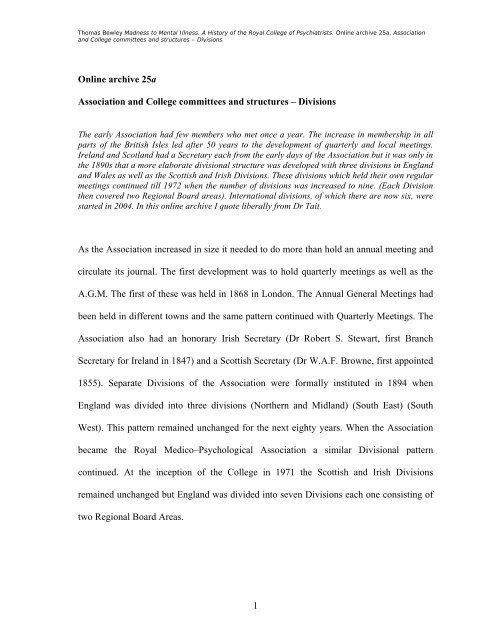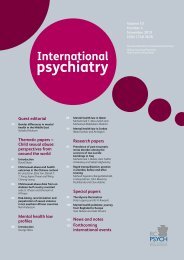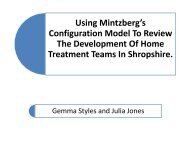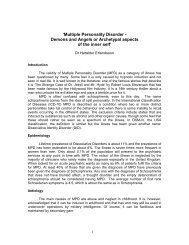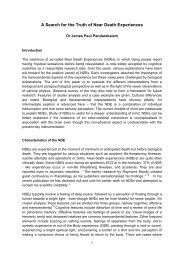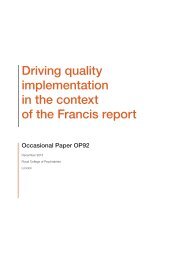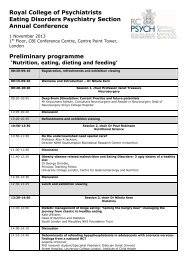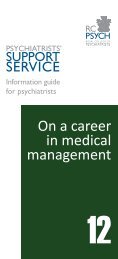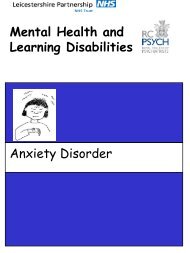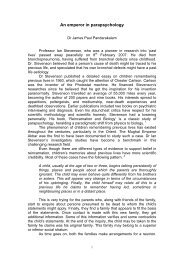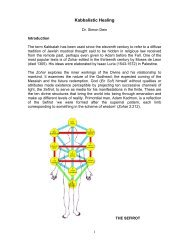Divisions - Royal College of Psychiatrists
Divisions - Royal College of Psychiatrists
Divisions - Royal College of Psychiatrists
You also want an ePaper? Increase the reach of your titles
YUMPU automatically turns print PDFs into web optimized ePapers that Google loves.
Thomas Bewley Madness to Mental Illness. A History <strong>of</strong> the <strong>Royal</strong> <strong>College</strong> <strong>of</strong> <strong>Psychiatrists</strong>. Online archive 25a, Association<br />
and <strong>College</strong> committees and structures – <strong>Divisions</strong><br />
Online archive 25a<br />
Association and <strong>College</strong> committees and structures – <strong>Divisions</strong><br />
The early Association had few members who met once a year. The increase in membership in all<br />
parts <strong>of</strong> the British Isles led after 50 years to the development <strong>of</strong> quarterly and local meetings.<br />
Ireland and Scotland had a Secretary each from the early days <strong>of</strong> the Association but it was only in<br />
the 1890s that a more elaborate divisional structure was developed with three divisions in England<br />
and Wales as well as the Scottish and Irish <strong>Divisions</strong>. These divisions which held their own regular<br />
meetings continued till 1972 when the number <strong>of</strong> divisions was increased to nine. (Each Division<br />
then covered two Regional Board areas). International divisions, <strong>of</strong> which there are now six, were<br />
started in 2004. In this online archive I quote liberally from Dr Tait.<br />
As the Association increased in size it needed to do more than hold an annual meeting and<br />
circulate its journal. The first development was to hold quarterly meetings as well as the<br />
A.G.M. The first <strong>of</strong> these was held in 1868 in London. The Annual General Meetings had<br />
been held in different towns and the same pattern continued with Quarterly Meetings. The<br />
Association also had an honorary Irish Secretary (Dr Robert S. Stewart, first Branch<br />
Secretary for Ireland in 1847) and a Scottish Secretary (Dr W.A.F. Browne, first appointed<br />
1855). Separate <strong>Divisions</strong> <strong>of</strong> the Association were formally instituted in 1894 when<br />
England was divided into three divisions (Northern and Midland) (South East) (South<br />
West). This pattern remained unchanged for the next eighty years. When the Association<br />
became the <strong>Royal</strong> Medico–Psychological Association a similar Divisional pattern<br />
continued. At the inception <strong>of</strong> the <strong>College</strong> in 1971 the Scottish and Irish <strong>Divisions</strong><br />
remained unchanged but England was divided into seven <strong>Divisions</strong> each one consisting <strong>of</strong><br />
two Regional Board Areas.<br />
1
Thomas Bewley Madness to Mental Illness. A History <strong>of</strong> the <strong>Royal</strong> <strong>College</strong> <strong>of</strong> <strong>Psychiatrists</strong>. Online archive 25a, Association<br />
and <strong>College</strong> committees and structures – <strong>Divisions</strong><br />
THE SCOTTISH DIVISION<br />
The Divisional structure in the Association and <strong>College</strong> is best exemplified with an<br />
account <strong>of</strong> the Scottish Division (Tait, 1992). In 1854 there was a suggestion to form a<br />
Branch Association in Scotland which was approved but not implemented. The following<br />
year Dr W.A.F. Browne was appointed Honorary Secretary for Scotland (Dr Browne later<br />
became the first President <strong>of</strong> the renamed Medico–Psychological Association in 1866). Dr<br />
Skae, the father <strong>of</strong> Edinburgh Psychiatry, was the first Scottish psychiatrist to be President<br />
<strong>of</strong> the early Association in 1863. The first A.G.M. <strong>of</strong> the Association to be held in Scotland<br />
had taken place under the Presidency <strong>of</strong> John Connolly in 1858. In September 1869 Dr<br />
John Batty Tuke <strong>of</strong> Cupar (later to be knighted as a politician) announced that, ‘it is the<br />
wish <strong>of</strong> the members <strong>of</strong> the Medico–Psychological Association resident in Scotland and<br />
the North <strong>of</strong> England to hold a meeting at Edinburgh…for the purpose <strong>of</strong> organising a<br />
Branch Association on the same basis as the one now working in London.’ This proposal<br />
was stimulated by the preceding 1868 meeting in London, when it was suggested that<br />
regular quarterly as well as annual meetings be held, and that two <strong>of</strong> these should be in<br />
Scotland or the North. In 1869 an Edinburgh meeting was held, and it was minuted that<br />
those present ‘resolve themselves into a Branch Association, always under the Medico–<br />
Psychological Association, with a view to having special meetings <strong>of</strong> those members who<br />
reside in Scotland and the North <strong>of</strong> England, and others who may choose to attend.’ Such a<br />
resolution had to be acceptable to the Association, and the then President was consulted as<br />
to its legitimacy and propriety. The President was Dr Thomas Laycock, Pr<strong>of</strong>essor <strong>of</strong> the<br />
Practice <strong>of</strong> Physic at Edinburgh University, and he assured the members that the plan was<br />
permissible. He appears to have anticipated the decision, attending in that year the Lord<br />
2
Thomas Bewley Madness to Mental Illness. A History <strong>of</strong> the <strong>Royal</strong> <strong>College</strong> <strong>of</strong> <strong>Psychiatrists</strong>. Online archive 25a, Association<br />
and <strong>College</strong> committees and structures – <strong>Divisions</strong><br />
Advocate concerning mentally defective criminals, and leading a deputation from ‘the<br />
Scottish Branch <strong>of</strong> the Association’. A second, largely scientific, meeting was held in<br />
Glasgow the following spring.<br />
The number and vigour <strong>of</strong> meetings varied over the years, with secretaries recording their<br />
traditional complaints. Even in the 1900s one wrote , ‘It is always a great difficulty getting<br />
papers for the meeting’, and the plaintive, ‘I have not received replies to my postcard from<br />
a great number <strong>of</strong> members’. At the turn <strong>of</strong> the century meetings were more frequently<br />
held in asylums, rather than centrally. This was to be recurrently advocated even as late as<br />
1932 when the then Dr David Henderson moved that future meetings should be held ‘in<br />
varying parts <strong>of</strong> the country, and that these meetings be <strong>of</strong> a whole day nature, so that<br />
adequate time is provided for the discussion <strong>of</strong> both business and scientific subjects’. This<br />
was unanimously carried.<br />
The Division’s announced functions were the advancement <strong>of</strong> knowledge <strong>of</strong> mental illness,<br />
and improving the treatment and care <strong>of</strong> the afflicted. In pursuing these aims the Scottish<br />
Division, a small body, was sometimes able to act formally under its own flag; but <strong>of</strong>ten<br />
individual members grouped together, and the intentions were realized through larger and<br />
more influential bodies, the established <strong>College</strong>s and the Universities. In Scotland<br />
psychiatry, represented by the Division and its members, probably had a closer relationship<br />
with mainstream medicine and the academic world than in some other parts <strong>of</strong> Britain. The<br />
Scottish members <strong>of</strong> the Association were always involved in direct representations to<br />
<strong>of</strong>ficial bodies, on behalf <strong>of</strong> their patients. In the middle 1850s there was a Governmental<br />
3
Thomas Bewley Madness to Mental Illness. A History <strong>of</strong> the <strong>Royal</strong> <strong>College</strong> <strong>of</strong> <strong>Psychiatrists</strong>. Online archive 25a, Association<br />
and <strong>College</strong> committees and structures – <strong>Divisions</strong><br />
enquiry into the care and legal status <strong>of</strong> lunatics in Scotland to which distinguished<br />
colleagues like Skae and Browne gave evidence; and the 1857 Lunacy (Scotland) Act,<br />
which established the Board <strong>of</strong> Control, was only the first <strong>of</strong> many statutory proposals and<br />
measures to whose ideas and drafting the members gave detailed comment and criticism.<br />
At the 1869 meeting there was a recommendation that wards be provided in the new<br />
Edinburgh <strong>Royal</strong> Infirmary ‘for teaching purposes’. This did not succeed, and was watered<br />
down to a resolution addressed to Universities and the General Medical Council that<br />
teaching in insanity, and examination thereon, should be imperative in any medical<br />
curriculum. It was only in 1888 that the GMC suggested this was desirable, and five years<br />
later it was made compulsory. Postgraduate education by the Division, pending the much<br />
later establishment <strong>of</strong> academic training courses, was carried out mainly by the<br />
presentation and discussion <strong>of</strong> cases and investigations.<br />
The Division was interested in research. In 1896 the Central Pathological Laboratory was<br />
founded, located in Edinburgh, supervised by a Special Board, elected by the<br />
Superintendents, with a view to conducting research and examining pathological material.<br />
This institution was to continue for several decades, with some duplication elsewhere – as<br />
in the West <strong>of</strong> Scotland Neuropsychiatric Institute. In the Laboratory’s research, and in its<br />
publications, there was some concentration on brain pathology, on infections, on theories<br />
<strong>of</strong> auto-intoxication, and on vaccines. As well as studies <strong>of</strong> that type, the Division<br />
recurrently tried to mount general enquiries <strong>of</strong> its membership. In 1895 Dr George<br />
Robertson suggested a Committee on Collective Investigation: to propose subjects, to<br />
4
Thomas Bewley Madness to Mental Illness. A History <strong>of</strong> the <strong>Royal</strong> <strong>College</strong> <strong>of</strong> <strong>Psychiatrists</strong>. Online archive 25a, Association<br />
and <strong>College</strong> committees and structures – <strong>Divisions</strong><br />
circulate these for criticism and to render uniform the methods <strong>of</strong> inquiry. The first enquiry<br />
was to be on Statistics and Types <strong>of</strong> Epileptic Insanity. It was later, as a <strong>College</strong> Division,<br />
that collaborative studies, from member groups in the Division flourished on, for example,<br />
first episode schizophrenia, or the condition <strong>of</strong> long-stay patients.<br />
Following the 1939-1945 War that Scottish special interest sections and groups were<br />
established in research, child psychiatry, learning disability, forensic psychiatry,<br />
psychotherapy, old age, and rehabilitation and management. These sections also concerned<br />
themselves with medico-political matters.<br />
The advent <strong>of</strong> the National Health Service meant an enormous expansion <strong>of</strong> the Division’s<br />
medico-political role, in both responding to Governmental consultation papers and<br />
developing their increasingly detailed suggestions and plans. In 1969 a memorandum on<br />
the ‘Development <strong>of</strong> Area Mental Health Services in Scotland’ was composed; in 1971 a<br />
memoranda on ‘Doctors in an Integrated Health Service’; and in 1973 an 80-page detailed,<br />
uninvited and widely circulated statement on ‘The Future <strong>of</strong> Psychiatric Services in<br />
Scotland’. Since then there has been a multitude <strong>of</strong> working groups and subcommittees,<br />
sometimes Division based, sometimes Governmentally sponsored with invited or<br />
nominated members from the Division. This places a considerable burden on committee<br />
members, and others. Scotland, with its own distinctive law, its own Health Department,<br />
its many statutory and voluntary institutions <strong>of</strong> entirely Scottish character, probably<br />
requires as much consultation with and input from the Division, as England. The Scottish<br />
5
Thomas Bewley Madness to Mental Illness. A History <strong>of</strong> the <strong>Royal</strong> <strong>College</strong> <strong>of</strong> <strong>Psychiatrists</strong>. Online archive 25a, Association<br />
and <strong>College</strong> committees and structures – <strong>Divisions</strong><br />
Division now awards two prizes for trainees in Scotland, the McHarg and the Margaret<br />
Methven Prize.<br />
THE IRISH DIVISION<br />
A single meeting <strong>of</strong> the Irish Division can give an example <strong>of</strong> Divisional meetings which<br />
provided opportunities for colleagues to meet. They generally took place at a mental<br />
hospital (Asylum) when papers would be given followed by discussion. This included<br />
medico-political and administrative matters. Reports <strong>of</strong> all the Divisional meetings were<br />
given in the Association Journal initially and later in the Notes and News Section.<br />
A summer meeting <strong>of</strong> the Irish Division was held at the District Asylum Kilkenny in July<br />
1906. Dr G.F. West, Physician Superintendent, occupied the Chair and there were also<br />
present Drs. C. Norman, A. Fitzgerald, T. Drapes, and W.R. Dawson (Hon.Sec.), as well as<br />
Dr L. Buggy, who was present as a visitor. The minutes <strong>of</strong> the previous meeting having<br />
been read, confirmed, and signed, the Hon. Secretary reported with reference to various<br />
matters therein contained, and a short informal discussion took place. Letters from Mrs.<br />
Molony and Dr Oscar Woods relative to resolutions <strong>of</strong> condolence passed at the last<br />
meeting <strong>of</strong> the Division were read. It was decided to hold the next meeting <strong>of</strong> the Division<br />
at the <strong>Royal</strong> <strong>College</strong> <strong>of</strong> Physicians, Dublin.<br />
Dr G.F. WEST contributed a ‘Note on Kilkenny Asylum.’<br />
DR CONOLLY NORMAN made a communication on ‘An Ancient Form <strong>of</strong> Physicians’<br />
Register,’ which he exhibited.<br />
6
Thomas Bewley Madness to Mental Illness. A History <strong>of</strong> the <strong>Royal</strong> <strong>College</strong> <strong>of</strong> <strong>Psychiatrists</strong>. Online archive 25a, Association<br />
and <strong>College</strong> committees and structures – <strong>Divisions</strong><br />
A short discussion followed, in which most <strong>of</strong> those present joined, and the meeting<br />
terminated.<br />
This account <strong>of</strong> a Divisional Meeting gives some idea <strong>of</strong> the local activities <strong>of</strong> a Division.<br />
Four years later the obituary <strong>of</strong> Dr Conolly Norman who gave the second presentation at<br />
this meeting drew attention to some <strong>of</strong> the other activities. When Dr Conolly Norman was<br />
President and the whole Association came to Dublin they were lavishly and hospitably<br />
entertained. His obituary also drew attention to one <strong>of</strong> the problems facing doctors in<br />
charge <strong>of</strong> asylums, the outbreaks <strong>of</strong> physical illness among asylum inmates which were not<br />
understood at the time. In Dr Conolly Norman’s case a vitamin B deficiency disease, Beriberi.<br />
This account <strong>of</strong> a single meeting <strong>of</strong> a remote division <strong>of</strong> the Association should give<br />
some idea <strong>of</strong> the interests and activities <strong>of</strong> psychiatrists at the time and what was being<br />
done for patients. The psychiatrists were administrators and the patients were housed,<br />
clothed and fed. Their activities were on the farm or in housework (laundry, kitchen). Dr<br />
Conolly Norman’s pre-First World War obituary shows a little <strong>of</strong> what they could, and<br />
could not do, and the way they liked to see themselves.<br />
The Irish Division <strong>of</strong> the MPA became the Irish Division <strong>of</strong> the RMPA in 1926 and <strong>of</strong> the<br />
<strong>College</strong> in 1971. At that time it consisted <strong>of</strong> all members in Ireland. For many years a<br />
Fellow and Member from the South and a Fellow and Member from the North were the<br />
Irish Division representatives on the <strong>College</strong> Council. The chairman changed every two<br />
years alternating between one from the South and one from the North. The secretaries<br />
similarly came from the North and South in turn. There were problems for the psychiatrists<br />
7
Thomas Bewley Madness to Mental Illness. A History <strong>of</strong> the <strong>Royal</strong> <strong>College</strong> <strong>of</strong> <strong>Psychiatrists</strong>. Online archive 25a, Association<br />
and <strong>College</strong> committees and structures – <strong>Divisions</strong><br />
in the South as the Department <strong>of</strong> Health did not wish to take advice from a British <strong>Royal</strong><br />
<strong>College</strong>. For this reason the members <strong>of</strong> the Committee <strong>of</strong> the Division in the South for a<br />
time called themselves the Irish Association <strong>of</strong> <strong>Psychiatrists</strong> and all members in the South<br />
became simultaneously members <strong>of</strong> the <strong>College</strong> and the Association. A few Southern Irish<br />
members thought they ought to form an Independent <strong>College</strong> <strong>of</strong> their own but the<br />
realization that premises would be expensive and a fear on the part <strong>of</strong> trainees that their<br />
education/training might not be accepted for the MRCPsych meant that this suggestion<br />
never got <strong>of</strong>f the ground.<br />
A further change came about in October 2002. The Irish Division had developed two<br />
sections, the Irish Section and the Northern Ireland Section and the Irish Section adopted<br />
the name the Irish <strong>College</strong> <strong>of</strong> <strong>Psychiatrists</strong> (Coláiste Siciatraithe na h’Éireann) as their<br />
business name. Both the Northern Ireland Section and the Irish <strong>College</strong> had representations<br />
on the Executive and Finance Committee. The Irish <strong>College</strong> <strong>of</strong> <strong>Psychiatrists</strong> was<br />
established in this form in 2002 responding to the need for a stronger identity for the<br />
pr<strong>of</strong>ession in Ireland. This had implications for the Northern Ireland Section <strong>of</strong> the Irish<br />
Division which then became a division in its own right. In order to continue the<br />
harmonious relationship between psychiatrists in the North and South the All-Ireland<br />
Institute <strong>of</strong> Psychiatry was set up in 2003 to act as the body to serve the joint interests <strong>of</strong><br />
the Irish <strong>College</strong> <strong>of</strong> <strong>Psychiatrists</strong> and the Northern Ireland Division <strong>of</strong> the <strong>College</strong> for the<br />
whole <strong>of</strong> Ireland. Administrative, educational and medico-political tasks had been<br />
increasing since the 1970s and in 1994 an <strong>of</strong>fice <strong>of</strong> the <strong>College</strong> was opened in Dublin,<br />
based at hospital premises at Stillorgan Dublin. An administrator was appointed and<br />
8
Thomas Bewley Madness to Mental Illness. A History <strong>of</strong> the <strong>Royal</strong> <strong>College</strong> <strong>of</strong> <strong>Psychiatrists</strong>. Online archive 25a, Association<br />
and <strong>College</strong> committees and structures – <strong>Divisions</strong><br />
business was put on a more formal footing. The <strong>of</strong>fice premises moved to St. Stephen’s<br />
Green in 1998. The Northern Ireland Division also acquired premises and an administrator.<br />
Northern Ireland was developing new mental health legislation and the Division worked<br />
actively to influence it. They were also proactively linking in with the Northern Ireland<br />
Assembly.<br />
THE ENGLISH DIVISIONS<br />
After 1897 England was divided into three regions:<br />
1. Northern Division included Cheshire, Cumberland, Derby, Durham, Lancashire,<br />
Leicester, Lincoln, Northumberland, Nottingham, Shropshire, Stafford, Warwick,<br />
Westmoreland, York, and North Wales.<br />
2. South- Western included Berks, Cornwall, Devon, Dorset, Gloucester, Hants,<br />
Hereford, Oxford, Somerset, Wilts, Worcester, and South Wales.<br />
3. South-Eastern included Bucks, Cambridge, Essex, Herts, Kent, London,<br />
Middlesex, Norfolk, Northampton, Suffolk, Surrey, and Sussex.<br />
.<br />
9
Thomas Bewley Madness to Mental Illness. A History <strong>of</strong> the <strong>Royal</strong> <strong>College</strong> <strong>of</strong> <strong>Psychiatrists</strong>. Online archive 25a, Association<br />
and <strong>College</strong> committees and structures – <strong>Divisions</strong><br />
The Boundaries <strong>of</strong> the Region were shown in a map in the Journal in October 1897.<br />
Notes and News<br />
[Oct.,1897]<br />
OUtLINE MAP OF DIVISIONS<br />
The Boundaries <strong>of</strong> the Division remained unchanged until the Inception <strong>of</strong> the <strong>College</strong> in<br />
1971. It was decided that two contiguous Regional Board Areas would form the new<br />
10
Thomas Bewley Madness to Mental Illness. A History <strong>of</strong> the <strong>Royal</strong> <strong>College</strong> <strong>of</strong> <strong>Psychiatrists</strong>. Online archive 25a, Association<br />
and <strong>College</strong> committees and structures – <strong>Divisions</strong><br />
<strong>Divisions</strong>. The new Divisional structure consisted <strong>of</strong> the Scottish, Irish and Welsh<br />
<strong>Divisions</strong> and seven separate English <strong>Divisions</strong> [North East; North West; Midlands; South<br />
Western; Chiltern and Thames Valley; East Anglian; Southern].<br />
The pattern <strong>of</strong> activities <strong>of</strong> the Division was similar to the pattern described for Scotland<br />
with regional meetings, <strong>of</strong>ten at a mental hospital. The papers given at regional meetings<br />
could be published in the Journal and the minutes <strong>of</strong> these meetings were published in the<br />
Association’s ‘Notes and News’. The Divisional structure was again reorganised in 1995 in<br />
order to have <strong>College</strong> <strong>Divisions</strong> that would be contiguous with National Health Service<br />
Regions making eight <strong>Divisions</strong> in England as well as the Scottish, Irish and Welsh<br />
<strong>Divisions</strong>. A short account <strong>of</strong> the Trent Division can serve as a paradigm for the other<br />
English <strong>Divisions</strong>. Devolution led to great changes for Wales, Scotland and Ireland.<br />
The Trent Division started in 1997. Its predecessors dated back to 1894. The interest <strong>of</strong> the<br />
Midlands was taken care <strong>of</strong> by the Northern and Midland Division, which began in 1897.<br />
The Midland Division (the immediate predecessor to the Trent Division) started<br />
functioning in 1972. The Midland Division covered the geographical area covered by the<br />
West Midland and Trent Regional Offices <strong>of</strong> the NHS and as a protocol, it was accepted<br />
that the Office bearers <strong>of</strong> the Division alternated between the two Regions and usually the<br />
Chair and the Honorary Secretary did not work in the same Region. The Executive<br />
Committee and the Divisional meetings were held at different locations alternating<br />
between the two Regions. It worked well. When the NHS was reorganised in 1997 the<br />
Council approved changes to the Divisional boundaries to be co terminus with the area<br />
covered by the Regional Offices <strong>of</strong> the newly defined NHS Executive. The Trent Division<br />
11
Thomas Bewley Madness to Mental Illness. A History <strong>of</strong> the <strong>Royal</strong> <strong>College</strong> <strong>of</strong> <strong>Psychiatrists</strong>. Online archive 25a, Association<br />
and <strong>College</strong> committees and structures – <strong>Divisions</strong><br />
worked very closely with the Trent NHS (E) and held successful annual joint meetings to<br />
discuss and debate issues <strong>of</strong> clinical importance. By then the Speciality Advisory<br />
Committees (<strong>of</strong> which Psychiatry was one) to the Regional Offices were dismantled thus<br />
leaving little or no room for Clinicians and Regional Officers to exchange ideas. Hospital<br />
Trusts were formed with almost total local control and management, with monitoring being<br />
one <strong>of</strong> the briefs given to the Regional Executives. The Trent Division was unique in that<br />
only one Regional Adviser <strong>of</strong> the <strong>College</strong> served the three Deaneries (North Trent in<br />
Sheffield, Mid Trent based in Nottingham and South Trent based in Leicester) as opposed<br />
to one Regional Adviser for each Deanery in the rest <strong>of</strong> the country. The Executive met<br />
quarterly. The Divisional meetings used to be held twice yearly, initially one <strong>of</strong> these being<br />
a residential meeting but because <strong>of</strong> increasing pressure <strong>of</strong> work these were reduced to one<br />
daylong meeting a year. Some 3 years ago it was possible to restore the Trent Research<br />
Presentation Prize for the trainees in the Division which had been postponed for a number<br />
<strong>of</strong> years because <strong>of</strong> lack <strong>of</strong> funds.<br />
WELSH DIVISION<br />
Since devolution, the NHS in Wales has followed a different path from that <strong>of</strong> the NHS in<br />
other parts <strong>of</strong> the UK. The Welsh Division has adapted to these changes and has been<br />
trying to work out the most effective means <strong>of</strong> influencing and commenting on those NHS<br />
reforms <strong>of</strong> greatest importance to psychiatry.<br />
12
Thomas Bewley Madness to Mental Illness. A History <strong>of</strong> the <strong>Royal</strong> <strong>College</strong> <strong>of</strong> <strong>Psychiatrists</strong>. Online archive 25a, Association<br />
and <strong>College</strong> committees and structures – <strong>Divisions</strong><br />
To those ends the Divisional Executive advises the Welsh Medical Committee, the main<br />
source <strong>of</strong> pr<strong>of</strong>essional advice to the Assembly, and the Division Chairman sits on the<br />
Academy <strong>of</strong> Medical <strong>Royal</strong> <strong>College</strong>s in Wales. Individual <strong>College</strong> members have<br />
contributed to working parties responsible for, among other things, strategies for the<br />
development <strong>of</strong> adult psychiatric services, child and adolescent mental health services and<br />
learning disability services. Also, Pr<strong>of</strong>essor Richard Williams was an influential<br />
contributor to the Carlisle Review which may well turn out to have implications for<br />
services in the UK as a whole. Recently there has been the issuing <strong>of</strong> the National Service<br />
Framework for adult mental health services in Wales, the interpretation and<br />
implementation <strong>of</strong> which will necessitate close monitoring by and contribution from the<br />
Division. Issues <strong>of</strong> concern to the Division have been psychiatric recruitment and retention<br />
at SpR and consultant levels and the Division has had assistance from the National<br />
Assembly to look into the issue in Wales. There is some concern that senior psychiatric<br />
staff may be lost to other parts <strong>of</strong> the UK unless psychiatric developments in Wales are<br />
strongly supported by the National Assembly.<br />
INTERNATIONAL DIVISIONS AND INTERNATIONAL ASSOCIATES<br />
Although the <strong>College</strong> has always had an international perspective, the establishment <strong>of</strong> a<br />
Board <strong>of</strong> International Affairs gave a new impetus to this area <strong>of</strong> its activities. Set up to<br />
address the needs <strong>of</strong> Members residing overseas, it enjoyed the support <strong>of</strong> those living and<br />
working in the United Kingdom and Ireland, manifested by the way in which the <strong>College</strong><br />
and its various committees have acknowledged the need to look outwards more than it did<br />
in the past. The <strong>College</strong> aimed to develop new partnerships so that it can play an active<br />
13
Thomas Bewley Madness to Mental Illness. A History <strong>of</strong> the <strong>Royal</strong> <strong>College</strong> <strong>of</strong> <strong>Psychiatrists</strong>. Online archive 25a, Association<br />
and <strong>College</strong> committees and structures – <strong>Divisions</strong><br />
role in international psychiatry for the benefit <strong>of</strong> all those suffering from mental illness.<br />
The <strong>College</strong> has developed International <strong>Divisions</strong> and International Associateships. These<br />
were approved by the Privy Council <strong>of</strong> the UK and were formally established at the<br />
<strong>College</strong>’s annual meeting in July 2004. The main objective <strong>of</strong> the International <strong>Divisions</strong> is<br />
to facilitate communication between the different countries in a region and to promote<br />
discussion about psychiatry. They focus on enhancing collaboration and co-operation in<br />
the training <strong>of</strong> psychiatrists, on facilitating pr<strong>of</strong>essional development and on increasing the<br />
pr<strong>of</strong>essional standing <strong>of</strong> all staff in the field <strong>of</strong> psychiatry and mental health. The aim <strong>of</strong><br />
the <strong>College</strong> was to build on the successes <strong>of</strong> earlier overseas groups and bring the<br />
Members and Fellows <strong>of</strong> the <strong>College</strong> together across national boundaries in local coalitions<br />
to better support mental health and benefit individuals as well as institutions.<br />
Creation <strong>of</strong> International <strong>Divisions</strong> <strong>of</strong>fers an opportunity to provide a coherent,<br />
pr<strong>of</strong>essional and responsive regional approach to training and educational activities in<br />
psychiatry and mental health. It is hoped that this multinational activity will engage the<br />
interests and enthusiasm <strong>of</strong> psychiatrists and psychiatric associations in countries in the<br />
region and that this will foster research and evaluation activities so that practice and<br />
experience can be shared widely. The International <strong>Divisions</strong> may become an influence on<br />
national policies for improving standards <strong>of</strong> care and encouraging de-stigmatisation <strong>of</strong><br />
mental illness. They hope to provide tangible support and benefit to individual<br />
psychiatrists and their institutions, and steadily raise the standing and status <strong>of</strong> psychiatry<br />
as a discipline.<br />
14
Thomas Bewley Madness to Mental Illness. A History <strong>of</strong> the <strong>Royal</strong> <strong>College</strong> <strong>of</strong> <strong>Psychiatrists</strong>. Online archive 25a, Association<br />
and <strong>College</strong> committees and structures – <strong>Divisions</strong><br />
It is expected that the International <strong>Divisions</strong> will work co-operatively with national<br />
associations and societies, WPA regional zonal representatives, and WHO and University<br />
departments in pursuant <strong>of</strong> mental health and the practice <strong>of</strong> psychiatry.<br />
Another initiative was the establishment <strong>of</strong> International Associateships. In many countries<br />
there are experienced, competent, and highly qualified psychiatrists who are not Members<br />
or Fellows <strong>of</strong> the <strong>Royal</strong> <strong>College</strong> <strong>of</strong> <strong>Psychiatrists</strong>. The category <strong>of</strong> Associate Membership <strong>of</strong><br />
the <strong>College</strong> has been developed to acknowledge the contribution <strong>of</strong> such psychiatrists who<br />
reside outside the United Kingdom and Ireland and who have a specialist qualification in<br />
psychiatry. The award <strong>of</strong> International Associateship by the Court <strong>of</strong> Elector will be based<br />
on nominations provided by the Members <strong>of</strong> the <strong>College</strong> and the contribution <strong>of</strong> the<br />
candidates to the activities <strong>of</strong> the <strong>College</strong> and to its international divisions. With the<br />
development <strong>of</strong> six International <strong>Divisions</strong> and Associate Membership, the <strong>College</strong> has<br />
taken a step in the promotion <strong>of</strong> collaboration and co-operation across national boundaries.<br />
Success will rely on the commitment <strong>of</strong> individual members and psychiatrists in different<br />
regions to build on these initiatives.<br />
References<br />
Ghodse, H. (2004) International <strong>Divisions</strong> and International Associateships. Bulletin <strong>of</strong> the Board <strong>of</strong><br />
International Affairs <strong>of</strong> the <strong>Royal</strong> <strong>College</strong> <strong>of</strong> <strong>Psychiatrists</strong>, 6, 1–2.<br />
Tait, A.C. (1992) The History <strong>of</strong> the Scottish Division. Psychiatric Bulletin, 16, 651–654.<br />
15


